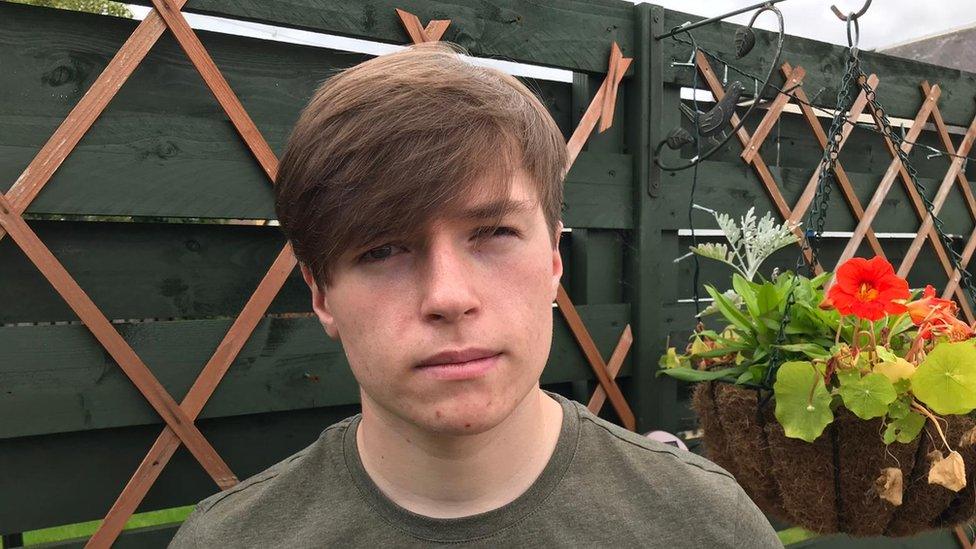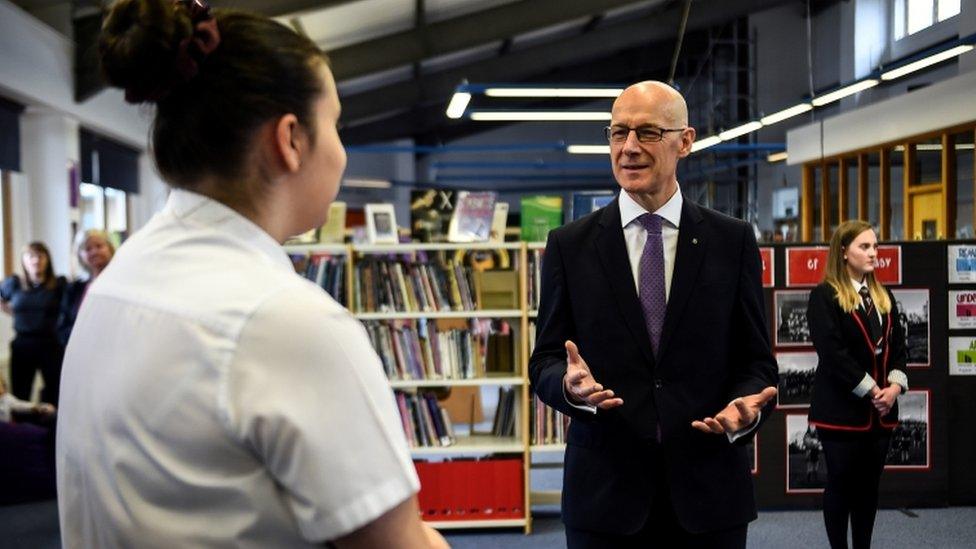Scotland's exam results: Why we think our grades were unfair
- Published

Lauren, Luke and Kelly are among thousands of students whose estimated grades were lowered
When Luke Robertson, 16, from Motherwell opened his exams results on Tuesday, the scramble of letters on the page wasn't what he had hoped for.
"It just doesn't make sense to me," Luke said. "I got a B in my physics prelim but the SQA gave me a C. I feel annoyed with them".
He had been predicted to achieve mostly As by his teachers and had been assured by them that his final grades would not be lower than his prelim performance.
But like many pupils across Scotland, Luke said he was "disappointed and shocked" by the surprise grades and now felt uncertain about the future.
His father, Alex Robertson, said Luke's school had promised his son's grades would not suffer because his exams were cancelled due to the pandemic.
However, Mr Robertson feels they have - and he's worried about going forward with the appeal process too.

Luke Robertson said he and many of his friends felt angry and disappointed
Luke had planned to go to university to study pharmacy or pharmacology but is now unsure about his next move.
"I don't know what I'm doing to do now. The school said they're going to try and appeal," he said.
"It's not just me. It's a lot of my friends too. I feel for everyone".
Many students believe they were penalised during the moderation process because their schools have historically not performed as well as others.
One pupil from East Kilbride, Lauren Steele, 16, has written an open letter to education secretary John Swinney criticising how grades were calculated.
She had been predicted to get a B in French by her teachers but was awarded a C by the SQA and said for some pupils "their hard work was being ignored".
Lauren said she sent the letter on behalf of the thousands of pupils who received exams results that were lower than they had anticipated.
She argued it should have been teachers who had the final say when it came to grades rather than them being modified by the SQA.

Lauren's French result was lowered by the SQA, going down from a teacher's predicted score of a B to a C
"These teachers have known me since I walked into that school at 11 years old and have monitored my work and progress all year long so in my opinion are the most qualified to predict results - not strangers in an office who know my name and postcode," Lauren said.
"Many students, including myself, have woke up this morning to sheer disappointment and grades far lower than their potential.
"We didn't receive the results we both need and deserve to take our education onto the next level at colleges and university".
'It's classism'
Kelly Wan, 17, from Eyemouth was predicted to get all As from the start of the year. She hoped to study medicine at university and said she needed all A grades to get there.
She achieved those results in her prelim exams and was told by teachers she would not go lower than her prelim grades.
However, Tuesday brought just two As out of five and although she said those results were "still amazing", they weren't what she needed to study medicine at university.

Kelly Wan said she was "really gutted" when she opened the text from the SQA
Kelly called it "classism" and said she would appeal her grades. Her teachers have reassured her that she has enough coursework evidence to do so but she said it was still disappointing.
"It's just disheartening and it means pupils lose trust in the system they're in," Kelly said.
"Everyone I've spoken to at my school is appealing their grades. That's how bad it is.
"It's classism and it's a feeling shared by a lot of us. Why should the hard work of kids living in deprived areas be undermined because of the fact the government doesn't support them as much?"
What do the SQA and the Scottish government say?
Speaking to the BBC's Good Morning Scotland programme, John Swinney said it was always accepted that there would be "questions" about the grading system that was introduced when exams were cancelled due to the coronavirus pandemic.
Mr Swinney said the attainment gap had narrowed between the wealthiest and poorest pupils, and that the pass rate was up for pupils from the most deprived areas.
The education secretary said: "What I would accept is that there will be individual results which will cause disappointment.

Mr Swinney met pupils who were receiving their results at Stonlelaw High School in Rutherglen on Tuesday
"That is why the final stage of the process that was put in place by the Scottish Qualifications Authority is a free appeals process which enables young people, in consultation with their schools, to come forward with evidence which would challenge some of the judgements that have been made.
"I would encourage any young person who feels disappointed by their results, and that they should have had a better result, to use that service".
The SQA said the most disadvantaged pupils had achieved better results this year than in 2019, with the number of passes also above the average for the past four years.
A spokesman added: "At Grades A to C, the attainment gap between the most and least disadvantaged young people is also narrower this year for National 5, Higher and Advanced Higher than for last year or the average gap for the last four years."